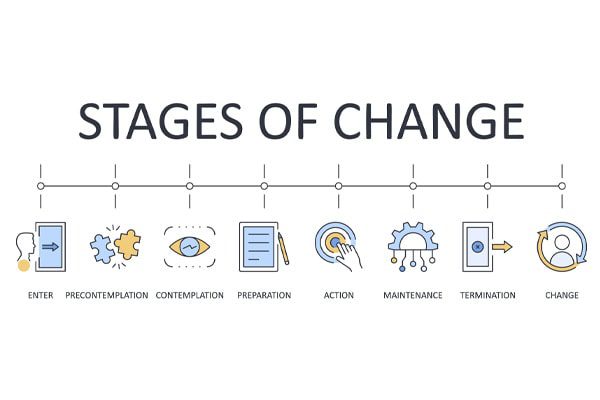Motivational Interviewing is an important technique in the field of behavior change and therapeutic communication. Originally developed by psychologists William R. Miller and Stephen Rollnick, motivational interviewing has evolved into a widely adopted approach for facilitating positive changes in individuals.
What is motivational interviewing?
The primary goal of motivational interviewing is to offer a client-centered, collaborative conversation that seeks to strengthen an individual’s motivation for change. The process is grounded in empathy, active listening, and a non-confrontational approach, creating a safe space for individuals to explore and articulate their own reasons for change.
What are the stages of change?
One of the key elements within the framework of Motivational Interviewing is understanding the Stages of Change model. This model, developed by James Prochaska and Carlo DiClemente, delineates the different stages individuals go through when contemplating and making changes in their behavior.
The Stages of Change, often referred to as the Transtheoretical Model of Behavior Change, consists of six distinct phases:
- Precontemplation: In this initial stage, individuals may be unaware of or underestimate the need for change. They may exhibit resistance or lack awareness of the problem.
- Contemplation: Individuals in this stage acknowledge the need for change, but remain ambivalent about taking action. They may weigh the pros and cons of change.
- Preparation: Transitioning from contemplation, individuals in the preparation stage are ready to act. They may be planning specific steps toward change and gathering resources.
- Action: This stage involves the actual implementation of the planned changes. Individuals actively modify their behavior, environment, or both.
- Maintenance: After the successful implementation of changes, individuals enter the maintenance stage, working to sustain new behaviors and prevent relapse.
- Termination: The individual has no desire to return to their previous behavior patterns.
Motivational interviewing recognizes that people can move back and forth through these stages, and the approach adapts accordingly. By understanding the Stages of Change, practitioners of motivational interviewing can tailor their communication strategies to meet individuals where they are in their journey, fostering a collaborative and effective path toward positive transformation.
The principles of motivational interviewing
Motivational interviewing operates on four foundational principles, each serving as a guiding beacon for practitioners navigating the delicate terrain of behavior change conversations. These principles not only shape the dynamics of the interaction but also foster an atmosphere conducive to intrinsic motivation and self-directed change.
- Active listening: Empathy — a deep understanding and appreciation for the client’s perspective — is a central component of motivational interviewing. By actively listening and reflecting without judgment, practitioners create a space where individuals feel heard and valued. Empathy establishes rapport and trust, essential components for a collaborative partnership in the change process.
- Finding the goal: Motivational interviewing recognizes that change often arises from recognizing the disparity between one’s current behavior and their desired goals or values. Practitioners skillfully guide individuals to explore this gap between desire and action, helping them articulate and internalize the need for change. This principle harnesses the power of cognitive dissonance, motivating individuals to bridge the gap between their aspirations and current actions.
- Identify motivation: Resistance is a common companion in conversations about change. Motivational interviewing approaches resistance not as a barrier to overcome but as a signal to adjust the communication strategy. Instead of confronting or opposing resistance, practitioners “roll with it,” acknowledging the individual’s autonomy and exploring the underlying reasons for their reluctance. This principle allows for a more fluid and collaborative interaction, reducing defensiveness and increasing receptivity to change.
- Make a plan for change: Motivational interviewing strongly emphasizes empowering individuals to believe in their capacity for change. By highlighting past successes, strengths, and internal resources, practitioners boost self-efficacy — the individual’s confidence in their ability to enact change. This principle reinforces the idea that change is possible and that the individual possesses the inherent capability to overcome obstacles on their journey toward a healthier, more fulfilling life.
Together, these four principles can create respectful, collaborative, and client-centered communication. Grounded in empathy, motivational interviewing empowers individuals to explore and embrace the intrinsic motivations that propel them through the stages of change.
How to adapt motivational interviewing to the Stages of Change
Each stage in the Stages of Change model represents a different level of readiness and commitment to change, requiring tailored strategies and interventions. Motivational interviewing can be adapted to each of these stages, using specific techniques and skills that match the individual’s needs and goals.
Here are some examples of how to adapt motivational interviewing for each of the stages of change:
- Asking open-ended questions that explore the pros and cons of the current behavior and the potential benefits of change
- Providing information and feedback in a neutral and respectful way, without lecturing or judging
- Expressing empathy and affirming the individual’s strengths and values
- Reflecting ambivalence and supporting self-exploration
Now, let’s explore how to adapt motivational interviewing within each stage of the Stages of Change model.
Pre-contemplation
The pre-contemplation stage is characterized by a lack of awareness or denial of the problem behavior and its consequences. Individuals in this stage are not interested in changing their behavior and may resist any attempts to persuade them otherwise. They may rationalize their behavior, avoid information that challenges their beliefs, or blame others for their situation. Motivational interviewing allows you to build rapport, express empathy, and raise awareness of the discrepancy between the individual’s current behavior and their goals or values.
Some motivational interviewing skills that are helpful at this point in the Stages of Change are:
- Use open-ended questions that invite the individual to share their perspective and feelings about the problem behavior and its effects on their life.
- Use reflective listening to demonstrate understanding and acceptance of the individual’s point of view and to highlight any ambivalence or inconsistencies in their statements.
- Use affirmations to acknowledge the individual’s strengths, abilities, and efforts, and to reinforce their sense of self-efficacy and autonomy.
- Use elicit-provide-elicit (EPE) to offer information or advice in a respectful and collaborative way, by first asking permission, then providing the information in a neutral and concise manner, and then checking for understanding and reaction.
Contemplation
In this stage, individuals are aware of the problem and have some interest in changing their behavior, but they are also ambivalent and unsure about how to proceed. They may weigh the costs and benefits of change or procrastinate and delay taking action. Motivational interviewing can help by resolving ambivalence, increasing motivation, and building commitment.
Some motivational interviewing skills that are helpful at this point in the Stages of Change are:
- Ask questions that underscore the importance of positive change and provide the confidence to “tip the scales” in the direction of that change.
- Exploring any ambivalence and resistance the individual may be expressing to help remove any emotional obstacles to change.
- Guide the individual to express self-motivational reasons for change.
Preparation
In this stage, individuals have decided to change their behavior and are making plans to take action. They may have taken some small steps toward change or set a specific goal or date to start. Motivational interviewing will prove useful here, as it reinforces motivation, enhances self-efficacy, and facilitates action planning.
Some motivational interviewing skills that are helpful at this point in the Stages of Change are:
- Brainstorming options and strategies for change, and helping the individual choose the best fit for them.
- Collaborating on a SMART (specific, measurable, attainable, relevant, and time-bound) goal and a concrete action plan.
- Anticipating potential barriers and challenges, and developing coping strategies and contingency plans.
- Eliciting change talk, or statements that express the desire, ability, need, or commitment to change.
Action
In this stage, individuals are actively implementing their plans and making the desired changes in their behavior. They may need support, encouragement, and feedback to sustain their efforts and overcome difficulties. Motivational interviewing can help by affirming progress, providing reinforcement, and addressing setbacks.
Some motivational interviewing skills that are helpful at this point in the Stages of Change are:
- Help the individual identify risk factors and come up with strategies to effectively deal with these situations.
- Work with the individual to develop a realistic view of change, so that they can make effective choices that lead to positive change.
- Support the individual’s self-belief, acknowledging that they can make positive changes in their life.
Maintenance
In this stage, individuals have maintained their behavior change for a significant period of time and are working to prevent relapse. They may face temptations, triggers, or stressors that challenge their commitment and resolve. Motivational interviewing aids in the change process by promoting self-monitoring, enhancing coping skills, and fostering resilience.
Some motivational interviewing skills that are helpful at this point in the Stages of Change are:
- Encouraging the individual to keep track of their progress and achievements, and to reward themselves for their efforts.
- Reinforcing the individual’s internal and external sources of support, and encouraging them to seek help when needed.
- Reviewing the individual’s coping strategies and contingency plans, and helping them revise or update them as necessary.
Termination
In this stage, individuals have achieved their desired behavior change and are confident that they will not relapse. They may have integrated the new behavior into their identity and lifestyle, or no longer perceive the old behavior as appealing or rewarding. Motivational interviewing can help by consolidating gains, acknowledging growth, and supporting future endeavors.
Some motivational interviewing skills that are helpful at this point in the Stages of Change are:
- Summarizing the individual’s journey and accomplishments, and highlighting the changes they have made in themselves and their lives.
- Exploring the individual’s plans and aspirations, and offering resources or referrals if needed.

The Stages of Change Worksheet
Change is hard for everyone, but living with mental health conditions only makes it harder. If your organization works with individuals living with substance use disorders, anxiety, depression, or other conditions that make creating change in their life difficult, we’ve put together this Stages of Change worksheet to help.
In this worksheet, you’ll find recommended strategies for guiding clients through each state outlined in the Stages of Change. We’ve also provided blank spaces so you can take notes on how your client is doing, their responses to your conversations, and more.
Download worksheet →







